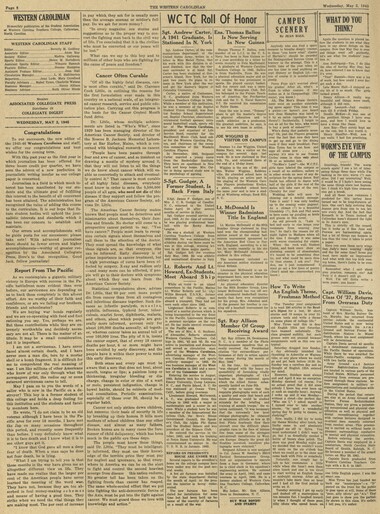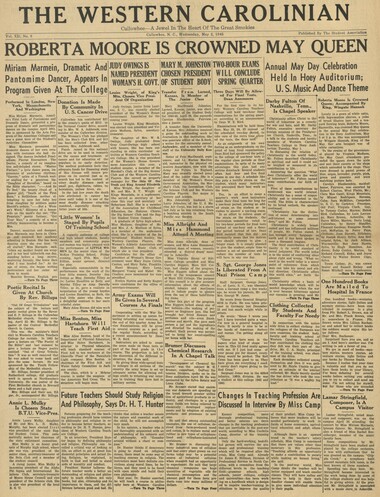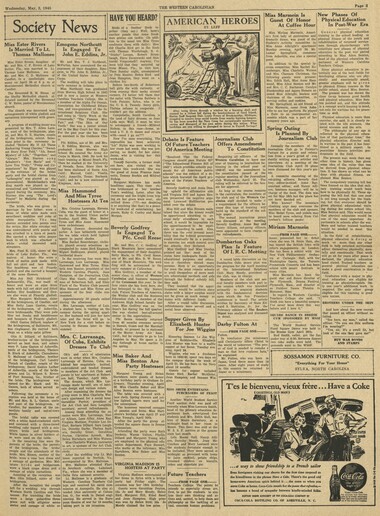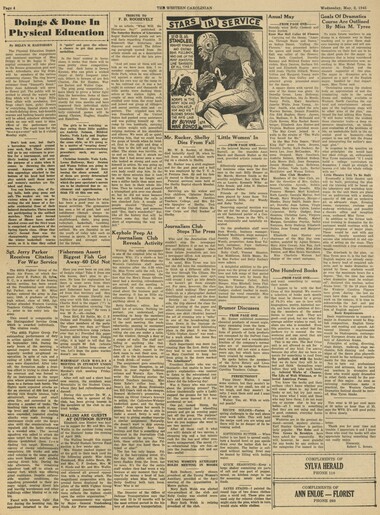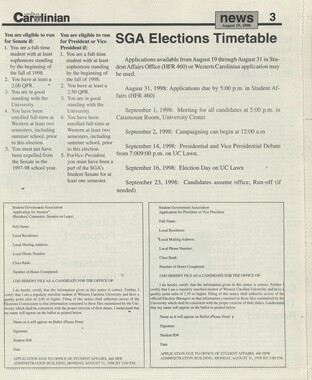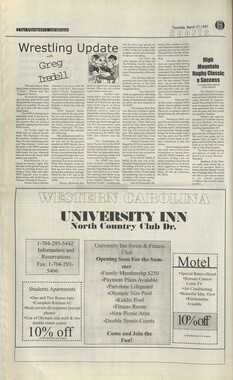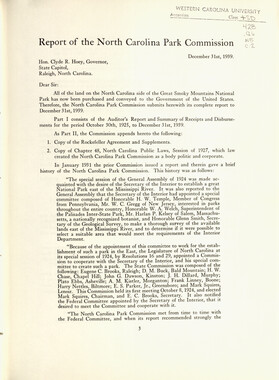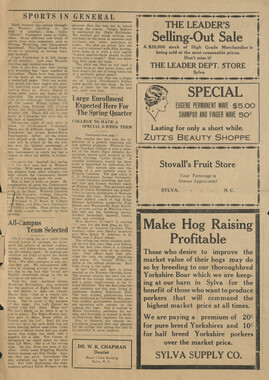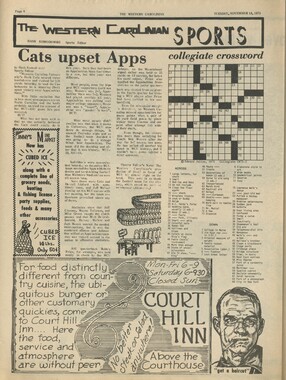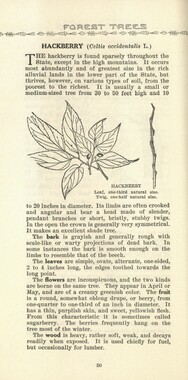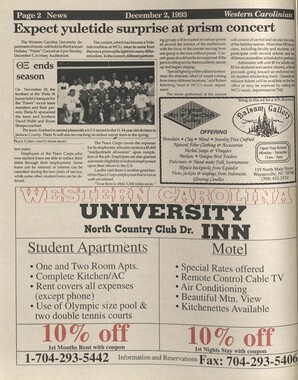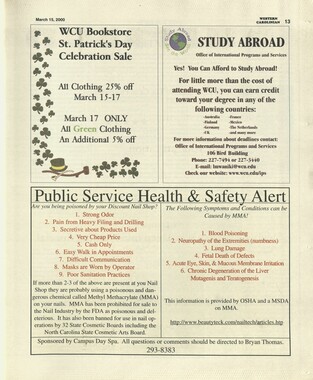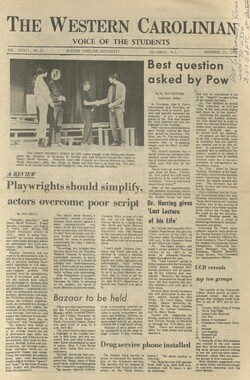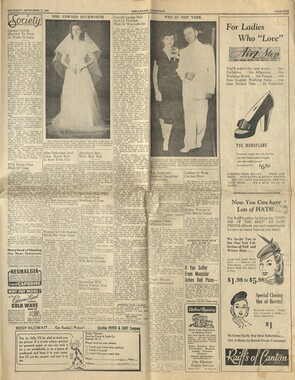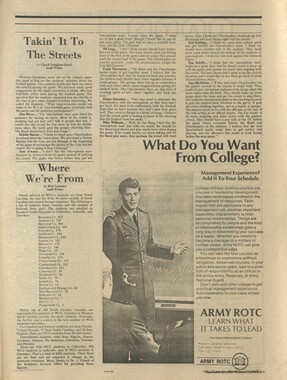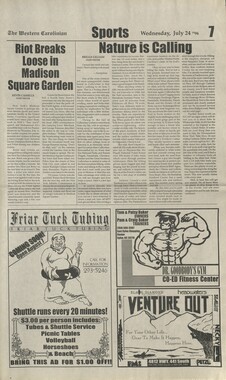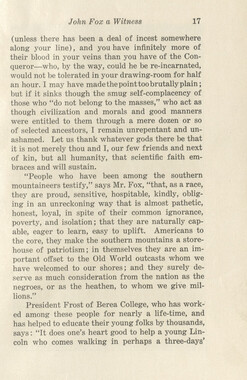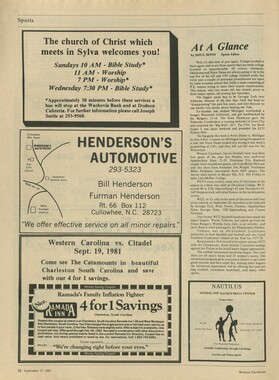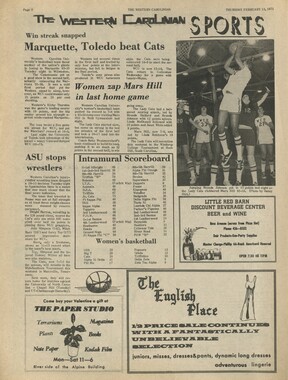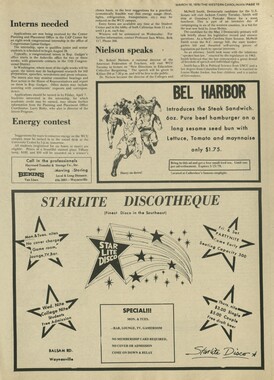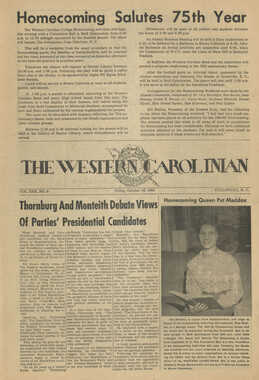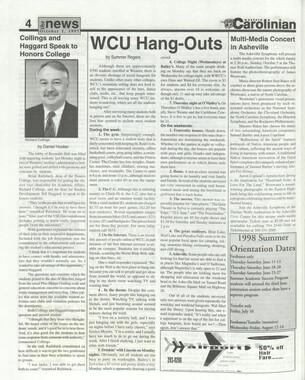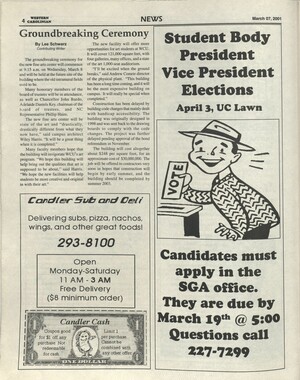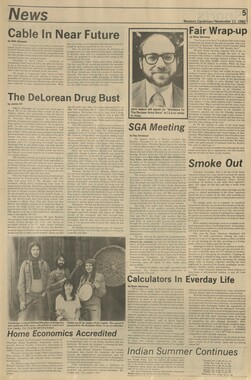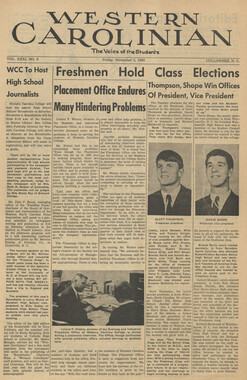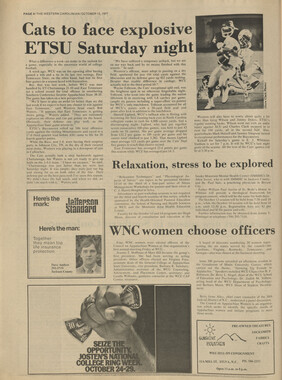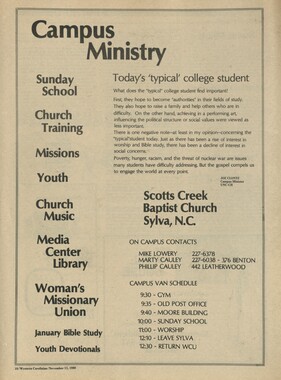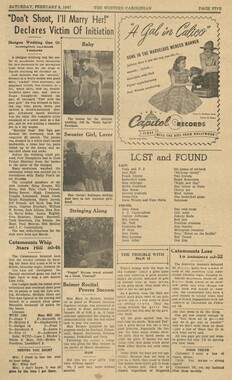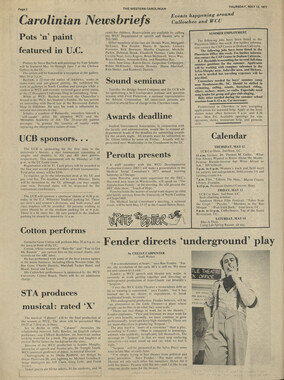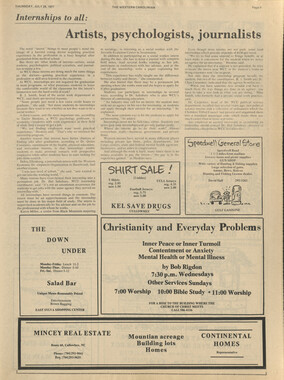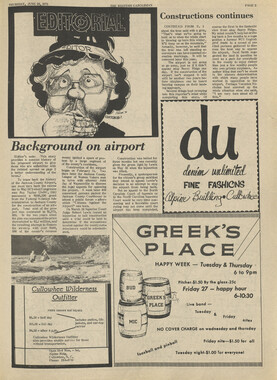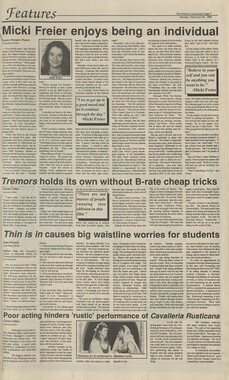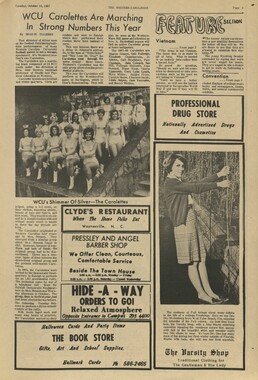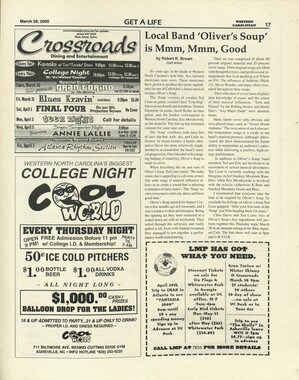Western Carolina University (20)
View all
- Canton Champion Fibre Company (2308)
- Cherokee Traditions (293)
- Civil War in Southern Appalachia (165)
- Craft Revival (1942)
- Great Smoky Mountains - A Park for America (2683)
- Highlights from Western Carolina University (430)
- Horace Kephart (941)
- Journeys Through Jackson (154)
- LGBTQIA+ Archive of Jackson County (15)
- Oral Histories of Western North Carolina (314)
- Picturing Appalachia (6679)
- Stories of Mountain Folk (413)
- Travel Western North Carolina (160)
- Western Carolina University Fine Art Museum Vitreograph Collection (129)
- Western Carolina University Herbarium (92)
- Western Carolina University: Making Memories (708)
- Western Carolina University Publications (2283)
- Western Carolina University Restricted Electronic Theses and Dissertations (146)
- Western North Carolina Regional Maps (71)
- World War II in Southern Appalachia (131)
University of North Carolina Asheville (6)
View all
- Allanstand Cottage Industries (62)
- Appalachian National Park Association (53)
- Bennett, Kelly, 1890-1974 (1295)
- Berry, Walter (76)
- Brasstown Carvers (40)
- Carver, George Washington, 1864?-1943 (26)
- Cathey, Joseph, 1803-1874 (1)
- Champion Fibre Company (233)
- Champion Paper and Fibre Company (297)
- Cherokee Indian Fair Association (16)
- Cherokee Language Program (22)
- Crowe, Amanda (40)
- Edmonston, Thomas Benton, 1842-1907 (7)
- Ensley, A. L. (Abraham Lincoln), 1865-1948 (275)
- Fromer, Irving Rhodes, 1913-1994 (70)
- George Butz (BFS 1907) (46)
- Goodrich, Frances Louisa (120)
- Grant, George Alexander, 1891-1964 (96)
- Heard, Marian Gladys (60)
- Kephart, Calvin, 1883-1969 (15)
- Kephart, Horace, 1862-1931 (313)
- Kephart, Laura, 1862-1954 (39)
- Laney, Gideon Thomas, 1889-1976 (439)
- Masa, George, 1881-1933 (61)
- McElhinney, William Julian, 1896-1953 (44)
- Niggli, Josephina, 1910-1983 (10)
- North Carolina Park Commission (105)
- Osborne, Kezia Stradley (9)
- Owens, Samuel Robert, 1918-1995 (11)
- Penland Weavers and Potters (36)
- Roberts, Vivienne (15)
- Roth, Albert, 1890-1974 (142)
- Schenck, Carl Alwin, 1868-1955 (1)
- Sherrill's Photography Studio (2565)
- Southern Highland Handicraft Guild (127)
- Southern Highlanders, Inc. (71)
- Stalcup, Jesse Bryson (46)
- Stearns, I. K. (213)
- Thompson, James Edward, 1880-1976 (226)
- United States. Indian Arts and Crafts Board (130)
- USFS (683)
- Vance, Zebulon Baird, 1830-1894 (1)
- Weaver, Zebulon, 1872-1948 (58)
- Western Carolina College (230)
- Western Carolina Teachers College (282)
- Western Carolina University (1794)
- Western Carolina University. Mountain Heritage Center (18)
- Whitman, Walt, 1819-1892 (10)
- Wilburn, Hiram Coleman, 1880-1967 (73)
- Williams, Isadora (3)
- Cain, Doreyl Ammons (0)
- Crittenden, Lorraine (0)
- Rhodes, Judy (0)
- Smith, Edward Clark (0)
- Appalachian Region, Southern (2393)
- Asheville (N.C.) (1886)
- Avery County (N.C.) (26)
- Blount County (Tenn.) (147)
- Buncombe County (N.C.) (1664)
- Cherokee County (N.C.) (283)
- Clay County (N.C.) (555)
- Graham County (N.C.) (233)
- Great Smoky Mountains National Park (N.C. and Tenn.) (478)
- Haywood County (N.C.) (3522)
- Henderson County (N.C.) (70)
- Jackson County (N.C.) (4692)
- Knox County (Tenn.) (21)
- Knoxville (Tenn.) (9)
- Lake Santeetlah (N.C.) (10)
- Macon County (N.C.) (420)
- Madison County (N.C.) (211)
- McDowell County (N.C.) (39)
- Mitchell County (N.C.) (132)
- Polk County (N.C.) (35)
- Qualla Boundary (981)
- Rutherford County (N.C.) (76)
- Swain County (N.C.) (2017)
- Transylvania County (N.C.) (247)
- Watauga County (N.C.) (12)
- Waynesville (N.C.) (68)
- Yancey County (N.C.) (72)
- Aerial Photographs (3)
- Aerial Views (60)
- Albums (books) (4)
- Articles (1)
- Artifacts (object Genre) (228)
- Biography (general Genre) (2)
- Cards (information Artifacts) (38)
- Clippings (information Artifacts) (191)
- Crafts (art Genres) (622)
- Depictions (visual Works) (21)
- Design Drawings (1)
- Drawings (visual Works) (184)
- Envelopes (73)
- Facsimiles (reproductions) (1)
- Fiction (general Genre) (4)
- Financial Records (12)
- Fliers (printed Matter) (67)
- Glass Plate Negatives (381)
- Guidebooks (2)
- Internegatives (10)
- Interviews (811)
- Land Surveys (102)
- Letters (correspondence) (1013)
- Manuscripts (documents) (619)
- Maps (documents) (159)
- Memorandums (25)
- Minutes (administrative Records) (59)
- Negatives (photographs) (5651)
- Newsletters (1285)
- Newspapers (2)
- Occupation Currency (1)
- Paintings (visual Works) (1)
- Pen And Ink Drawings (1)
- Periodicals (193)
- Personal Narratives (7)
- Photographs (12982)
- Plans (maps) (1)
- Poetry (5)
- Portraits (1655)
- Postcards (329)
- Programs (documents) (151)
- Publications (documents) (2237)
- Questionnaires (65)
- Scrapbooks (282)
- Sheet Music (1)
- Slides (photographs) (402)
- Sound Recordings (796)
- Specimens (92)
- Speeches (documents) (15)
- Tintypes (photographs) (8)
- Transcripts (322)
- Video Recordings (physical Artifacts) (23)
- Vitreographs (129)
- Text Messages (0)
- A.L. Ensley Collection (275)
- Appalachian Industrial School Records (7)
- Appalachian National Park Association Records (336)
- Axley-Meroney Collection (2)
- Bayard Wootten Photograph Collection (20)
- Bethel Rural Community Organization Collection (7)
- Blumer Collection (5)
- C.W. Slagle Collection (20)
- Canton Area Historical Museum (2110)
- Carlos C. Campbell Collection (198)
- Cataloochee History Project (65)
- Cherokee Studies Collection (4)
- Daisy Dame Photograph Album (5)
- Daniel Boone VI Collection (1)
- Doris Ulmann Photograph Collection (112)
- Elizabeth H. Lasley Collection (1)
- Elizabeth Woolworth Szold Fleharty Collection (4)
- Frank Fry Collection (95)
- George Masa Collection (173)
- Gideon Laney Collection (452)
- Hazel Scarborough Collection (2)
- Hiram C. Wilburn Papers (28)
- Historic Photographs Collection (236)
- Horace Kephart Collection (861)
- Humbard Collection (33)
- Hunter and Weaver Families Collection (1)
- I. D. Blumenthal Collection (4)
- Isadora Williams Collection (4)
- Jesse Bryson Stalcup Collection (47)
- Jim Thompson Collection (224)
- John B. Battle Collection (7)
- John C. Campbell Folk School Records (80)
- John Parris Collection (6)
- Judaculla Rock project (2)
- Kelly Bennett Collection (1314)
- Love Family Papers (11)
- Major Wiley Parris Civil War Letters (3)
- Map Collection (12)
- McFee-Misemer Civil War Letters (34)
- Mountain Heritage Center Collection (4)
- Norburn - Robertson - Thomson Families Collection (44)
- Pauline Hood Collection (7)
- Pre-Guild Collection (2)
- Qualla Arts and Crafts Mutual Collection (12)
- R.A. Romanes Collection (681)
- Rosser H. Taylor Collection (1)
- Samuel Robert Owens Collection (94)
- Sara Madison Collection (144)
- Sherrill Studio Photo Collection (2558)
- Smoky Mountains Hiking Club Collection (616)
- Stories of Mountain Folk - Radio Programs (374)
- The Reporter, Western Carolina University (510)
- Venoy and Elizabeth Reed Collection (16)
- WCU Gender and Sexuality Oral History Project (32)
- WCU Mountain Heritage Center Oral Histories (25)
- WCU Oral History Collection - Mountain People, Mountain Lives (71)
- WCU Students Newspapers Collection (1744)
- Western North Carolina Tomorrow Black Oral History Project (69)
- William Williams Stringfield Collection (2)
- Zebulon Weaver Collection (109)
- African Americans (388)
- Appalachian Trail (32)
- Artisans (521)
- Cherokee art (84)
- Cherokee artists -- North Carolina (10)
- Cherokee language (21)
- Cherokee pottery (101)
- Cherokee women (208)
- Church buildings (166)
- Civilian Conservation Corps (U.S.) (110)
- College student newspapers and periodicals (1830)
- Dams (94)
- Dance (1023)
- Education (222)
- Floods (60)
- Folk music (1015)
- Forced removal, 1813-1903 (2)
- Forest conservation (220)
- Forests and forestry (917)
- Gender nonconformity (4)
- Great Smoky Mountains National Park (N.C. and Tenn.) (154)
- Hunting (38)
- Landscape photography (10)
- Logging (103)
- Maps (84)
- Mines and mineral resources (8)
- North Carolina -- Maps (18)
- Paper industry (38)
- Postcards (255)
- Pottery (135)
- Railroad trains (69)
- Rural electrification -- North Carolina, Western (3)
- School integration -- Southern States (2)
- Segregation -- North Carolina, Western (5)
- Slavery (5)
- Sports (452)
- Storytelling (245)
- Waterfalls -- Great Smoky Mountains (N.C. and Tenn.) (66)
- Weaving -- Appalachian Region, Southern (280)
- Wood-carving -- Appalachian Region, Southern (328)
- World War, 1939-1945 (173)
Western Carolinian Volume 12 Number 09
Item
Item’s are ‘child’ level descriptions to ‘parent’ objects, (e.g. one page of a whole book).
-
-
Page 2 THE WESTERN CAROLINIAN Wednesday, May 2, 1945 WESTERN CAROLINIAN Bi-monthly publication of the Student Association at Western Carolina Teachers College, Cullowhee, North Carolina. WESTERN CAROLINIAN STAFF Editor Beverly M. Godfrey Associate Editor Anne Ray Society Editor Madrie Galloway Sports Editor Helen M. Hartshorn Assistant Sports Editor Wingate Hannah Feature Editor Jeanne Hampton Assistant Feature Editor Jean Hall Circulation Manager L. H. Halliburton Reporters ..Jean Lyda, Mary Crawford Faculty Advisors ._. Mabel Tyree, Charlotte Watson Business Manager Nancy Allison Business Advisor Ruth Oliver Hinds Member ASSOCIATED COLLEGIATE PRESS Distributor Of COLLEGIATE DIGEST WEDNESDAY, MAY 2, 1945 ——■i M ■■ ■>!■■■■ ■■ —■ M ■■ ■»■——-■— — — "Mi — »!■'■■■■ Congratulations To our successors, the new editor of the 1945-46 Western Carolinian and staff, we offer our congratulations and best wishes for the coming term. With this past year as the first year in which journalism has been offered for three hours credit per quarter, we have seen the advent of a new perfection in journalistic writing insofar as our college paper is concerned. Journalism is a field in which much interest has been manifested by our students and the ultimate goal of fulfilling this interest to the benefit of all concerned has been attained. The administration has recognized the value of adding this course to the curriculum. It is our hope that future student bodies will uphold the journalistic interests and standards which it has been our concern to establish and maintain. Our errors and accomplishments will be guide posts for our successors: please take note! With advanced journalism there should be fewer errors and higher accomplishments—worthy of greater recognition by the Associated Collegiate Press. Here's to that recognition. Good luck, fellow journalists! in pay which, they ask for is usually more than the average seaman or soldier's full pay. Do we ask for more money? "In every magazine are stories and suggestions as to the proper way to convert the fighting man back to the civil way of life. I've concluded that it is the civilian who must be converted or our peace will be lost." What can we say to this boy and to millions of other boys who are fighting for the cause of peace and freedom? WCTC Roll Of Honor Sgt. Andrew Carter, A 1941 Graduate, Is Stationed In N. York Ens. Thomas Ballou Is Now Serving In New Guinea „H CAMPUS SCENERY By JEAN HALL Report From The Pacific As we contemplate a gigantic military victory in Europe with success in the Pacific battlefront more evident than ever before, our servicemen are depending on us to back them completely in this all-out effort. Are we worthy of their faith and confidence, or are we failing our brothers, friends and schoolmates? We are buying war bonds regularly and we are co-operating with food and fuel rationing you say. Yes, perhaps we are. But these contributions while they are extremely worthwhile and decidedy necessary are not all. There is the matter of attitude. It may be a small consideration, but it is important. I am not a serviceman. I have never faced almost certain death, and I have never seen a man die, torn by a mortar shell or a bomb fragment. It is difficult for me to comprehend the real meaning of war. I am like millions- of other Americans who know of war only through what the newspapers print, the radios say or some returned serviceman cares to tell. May I pass on to you the words of a sailor who is now in the Pacific on a destroyer? This boy is a former student of this college and holds a deep feeling for this institution and the students and faculty members here. He wrote, "I do not claim to be an old veteran although I have been in the Pacific area for over 18 months. I have met the Jap on many occasions throughout this period, and recently more frequently than before. I very definitely know what it is to face death and I know what it is to see other guys get it. "I know that God gave all men a deep fear of death. When a man says he does not fear death, he is lying. "What I am trying to tell you is that these months in the war have given me an altogether different view on life. They have made me realize that the larger per cent of the American people have never learned the meaning of the word war. They have not, because they are too absorbed in foul money-making schemes and means of having a good time. They strike when we need the vital things they are making most. The per cent of increase Cancer Often Curable "Of all the highly fatal diseases, can- is most often curable," said Dr. Clarence Cook Little, in outlining the reasons for the first formulation ever made in this country on a national scale, of an integrated cancer research, service and public education plan. Carrying out this program is the basis for the Cancer Control Month fund drive. Dr. Little, whose multiple achievements are listed in "Who's Who", since 1929 has been managing director of the American Cancer Society, and drector of the Roscoe B. Jackson Memorial Laboratory at Bar Harbor, Maine, which is concerned with biological research on cancer. "People have been passive through fear and awe of cancer, and so insistent on drawing a mantle of mystery around it, that they will not listen to all the things we do know about cancer which will enable us concertedly to attack and eventually control it." That cancer is most curable of all highly fatal diseases, everybody must know in order to save the 5,500,000 people of all ages, who need not die of this disease if they support and follow the program of the American Cancer Society, advises Dr. Little. The American Cancer Society makes known that people must be detectives and missionaries about themselves, their families and friends. No doctor will come to a prospective cancer patient to say, "You have cancer." People must learn to recognize certain signals about themselves and call them to the attention of the doctor. They must spread the knowledge of what these signals are, so that everyone else can be informed. Early discovery is of prime importance in cancer treatment, but a high percentage of cures have been effected by surgery, X-ray and radium only —and many more can be effected, if people will go to their doctors with symptoms about which they can learn from the American Cancer Society. Statistical computations show, advises Dr. Little, that 60 per cent more people die from cancer than from all contagious and infectious diseases together. Such diseases as infantle paralysis, measles, syphilis, influenza, typhoid fever, tuberculosis, scarlet fever, diphtheria, malaria, and others, about which people are generally more informed, account only for about 100,000 deaths annually, all together, whereas cancer takes an annual toll of over 160,000 lives. The pity of it is, insists the cancer expert, that of every 18 cancer deaths per hour, 6 or more might have been avoided by early discovery, and the people have it within their power to make this early discovery. Both sexes and every age must be aware that a sore that does not heal, about mouth, tongue or lips; a painless lump or thickening, irregular bleeding or discharge, change in color or size of a wart or mole, persistent indigestion, change in bpwel habits, should be subjects of medical consultation. Periodic examinations, especially of those over 30, should be a regular habit. Cancer not only strikes down children, but removes their basis of security in life by breaking up their homes. It kills more mothers of school children than any other disease, and almost as many fathers. Broken homes are in many cases the forerunner of child deliquency, which has been much in the public eye these days. The people must know these things, said Dr. Little. "They must be intelligently informed, they must use their knowledge of the terrible price they must pay for neglect and ignorance, so that everywhere in America we can be on the alert to fight and control the second heaviest scourge from disease this nation endures, No greater toll has been taken on the fighting fronts than cancer has reaped. The same whole-souled effort that we put into fighting the anti-democratic forces of the Axis, must be put into the fight against cancer. We must guard those we love with knowledge and action." Sgt Andrew Carter, of the communications department of the United States Army, writes in a letter to Miss Mabel TyTee, that his work with this division is almost finished, now that the German surrender is at hand. Sgt. Carter has been stationed at Governor's Island, New York, for the past two years. He plans to remain in New \ork after the war and get his master's degree at Columbia University. Carter, a native of Cooleemee, N. C, graduated from Western Carolina Teachers College in 1941. While a member of this institution, he was a member of the Baptist Student Union Council, was Bap- tist Sunday School Superintendent, Baptist Chorister, cheerleader, intramural football sponsor, intramural basketball coach, sports editor of The Western Carolinian, president and organizer of Life Service Band, reporter for the MacDowell Music Club, head usher for the Western Carolina Players, and chairman of the reception committee of the Western Carolina Players. In November, 1943, Sergeant Carter married a young nurse from the Rockefeller Institute. They have an apartment in New York and keep house. Mrs. Carter is doing special study now in the psychology of nursing. H„ •■B WHAT DO YOU THINK? S-Sgt. Gudger, A Former Student, Is Back From Italy S-Sgt. James F. Gudger, son of Mrs. J. C. R. Gudger of Candler, N. C, returned to the United States April 20 after several months of service in Italy. Sgt. Gudger entered service August, 1942. At the time of entrance he was playing professional baseball with the Rocky Mount League. He was a student at Western Carolina Teachers College from 1939-1942. He was outstanding in athletics during the three years he was at this college, winning letters in all three major sports. Sgt. Gudger left for overseas duty May, 1944. He was athletic and recreational director in Italy. Ensign Thomas P. Ballou, com mander of an L.C.I, in the U. S Navy, has been in New Guinea over a year according to a letter he wrote recently to Pete MacDonald. A graduate of Western Carolina Teachers College in 1943, Ballou is from Nashville, Tenn. He was a physical education major and on the campus he was prominent in sports. He played varsiyt basketball fou ryears and was a member of the Monogram Club. Ballou belonged to the Future Teachers of America, the Pre-Service club and the U. S. Naval Reserve V-7. He received his commission at Notre Dame. Once the war is over, "Tommy'' plans to get his master's degree in physical education and to coach athletics as a profession. His greatest ambition, he says, is to see his own team in action. JOE WIGGINS IS VISITOR ON CAMPUS Seaman 1-c Joe Wiggins, United States Navy, was a visitor on the campus for several days last week. He is now stationed in Norfolk, Va., and returned there at the end of a 10-day leave. Wiggins is the son of Mr. and Mrs. Walter Wiggins, Robbinsville. He attended school here in '42-'43, playing an active part in the staging of the Western Carolina Players productions. Evelyn, a sister, attended school here the same year and is now a student at Winthrop college, Rock Hill, S. C. Lt. McDonald Is Winner Badminton Title In England Lt. Roberts And Lt. Howard, Ex-Students, Meet Aboard Ship While en route to an island somewhere in the Pacific, Marine Lt. Walter Roberts and Lt. (Jg) Willie Howard, U.S.N.R., former students of this college, met aboard a transport. They had not seen each other since 1942. Lieutenant Roberts is in command of a marine platoon which is being transported to the war front in the Pacific. Lieutenant Howard is assistant navigator on the vessel. He has made several crossings in the Pacific area. The son of Mrs. S. G. Buckner, of Alexander, Roberts attended Western Carolina Teachers College in 1941, '42 and '43. He was active in journalism and dramatics and served as circulation manager of the Western Carolinian, advertising manager of the Western Carolina Players and sports publicity manager in 1942. He was business manager of the West- era Carolinian in 1943 and a member of the Catamount staff. Entering the service in August, 1943, Roberts took his training at Emory University, Camp Lejeune, N. C, and Parris Island, S. C. He was stationed at Ocean View, Calif., before going overseas. Lieutenant Howard, McCormick, S. C, was graduated from this college in 1942 with a major in mathematics and a minor in science. While a student here he was a member of the International Relations Club, the Men's House Government Council, the Speaker's Club, the Alpha Phi Sigma and the Student Senate and was president of the Science Club. He entered the service in October, 1942, and took his training at Notre Dame University. He was commissioned an ensign in the U. S. N. R. in January, 1943. Lt. Marion McDonald of the 95th Bomber Group stationed in England won the championship badminton award at the recent badminton tournament sponsored by the American Red Cross in Norwich, England, according to a letter he wrote recently to his sister, Mary McDonald Johnston, a student in this college. The tournament included every American soldier stationed in Great Britain. Lieutenant McDonald is ■ an instructor in the physical education department here, now on leave for military service. As physical education director for the 95th Bomber Group, Lieutenant McDonald has run off several intramural basketball tournaments that have won recognition for his group, Mrs. Johnston said. At the present her brother is running off a baseball tournament for his squadron. Anybody who can find a spare moment to breathe deeply (except in those "you know what" classes of Hartsie's) should be awarded the Distinguished Service Cross of bravery in the attempt. This is a hectic time of the year when no one has time to read anything except History or English Lit.—unless of course it is scandal-coated gossip. Perry Frye isn't worried about his grades! After all, what's a flunk in other courses if one makes an A in Campusology. (His major, you know.) Ah, The Men's House Government went on another entertaining spree again! This time it was a picnic—or haven't you heard how Jean Hampton was lured to it by an onion (apologies to Joe Henry?) Incidentally, I forgot to run an ad for the boys, who wants to buy a peck of onions???? Who's doing that pathetic moaning? Oh, just the Players groaning over the fact that now they have to get up and go to the dining room if they want breakfast. Poor Miss Tyree has to eat ham and eggs all alone now but anyway it's nice to see Tommy Corley come in class only about 20 or so minutes late. "No-Man's Land"—the W.C.T.C. girls have labeled the campus as a result of no soldiers, sailors or in other words no men of any description for the spring dance. Bud Smith has offered to dance with half of the girls if the rest of the males will take care of the rest. Chivalry for you! Wedding bells will soon be chiming out a doleful message. Take it easy! I was only leading up to the coming water pageant. As a climax (?) to a beautiful friendship (?), Bob and Phil seem to have come up gurgling as bride and groom in this event. An old proverb is, "Late to bed and early to rise keeps your roommate from wearing your ties." So that's the reason for all- night lights in Madison when all the time I thought it was some work worm cramming for exams. When the rock wall, Student Union, and book store show an alarming amount of absenteeism, it's bound to be something drastic, and what could be more drastic than exams, I ask you? Pardon, me I just remembered I must go say a few lines of poetry. (Don't mind me—overworked you know.) Again the question is placed before the students to see what they have to say about doings on the campus. Now that May Day is over and things went off perfectly, let's see what the students' reaction is: Ann Soderquist—Yes, I do like the idea of having May Day, but oh, how relieved I am to know that it's over. "Toot" Hannah—Sure was a lot of work, but how could I ever forget such a day. Lela Moore Hall—I enjoyed every bit of it so much. The girls looked grand. Nancy Allison—It really was beautiful and things were swell, although it did rain. Mary Leonard—Just couldn't wait till 5 o'clock Friday. Doodle McKee—It was one of the prettiest things I have ever seen, and how I would love to have a dress like those. Ann Ray—They surely kept me on the run, but it was worth it. Henry Stauffer—Well, now I can waltz. I had fun practicing. How To Write An English Theme, Freshman Method WORM'S EYE VIEW OF THE CAMPUS Greetings, friends! The worm crawls again! I see a lot of interesting things these days while I'm basking in the nice, warm (?) sunshine. Did I say interesting? Well, it would be if I hadn't been seeing the same things since last September. I think it's high time someone else got a break. And all those new romances I predicted for this spring have turned out to be long-distance affairs. One can't help noticing that Jeanne gets from one to ten letters every day. And the fact that Kenneth is in Texas instead of Cullowhee hasn't dimmed the light in Jo Anne's eyes. This is strictly off the record, but it looks as if Bee Jane and Peewee are halrmonizling again. But a lot of things can happen in less than the time it takes to print a paper. Have you seen those navy wings that Judy's been wearing night and day for some time? Some guy must have made an impression! And what with this top kick coming home, there's liable to be complications. Remember what I said about play practice, romance, etc? Ask Pete if it doesn't still go. Well, I'm off! Gotta write a term paper, you know! REPAIRS ON PRESIDENTS HOUSE ARE UNDER WAY Several repairs to the president's home on the college campus have been under way for the past several weeks. A hot air furnace was installed by the state department during the month of April. At the present the interior is being redecorated. The new furnace has been slated for installation for some time but had been held up because of the scarcity of furnaces as a result of the war. Sgt. Ray Allison Member Of Group Receiving Award Sgt. Ray Allison, 24, Swannanoa, N. C, is a member of the Photo Reconnaissance squadron that recently received the Presidential citation "for extraordinary performance of duty in action against the enemy during the month of May, 1944." At the time, his organization "was charged with the heavy responsibility of furnishing vitally important photographs of the beaches on the continent upon which the Allied forces subsequently landed on June 6th. "In order to insure that the requisite photographs were of such a quality and scale that beach and shore defenses could be studied minutely for the briefing and training of assault troops," the citation continued, "it was necessary that the extremely low level oblique photographs be obtained at minimum altitude as low as 25 feet. Pilots fearlessly flew their aircraft over the difficult photographic runs in the face of intense fire from some of the strongest anti-aircraft installations in Western Europe. Despite the great difficulties involved, excellent photographs were obtained." Sergeant Allison is now assigned to Col. James M. Smelley's 363rd Tactical Reconnaissance Group, first air organization to operate from a base in Germany, where he is chief clerk in his squadron's engineering section. He entered the army in April, 1943, and came overseas in April, 1944. He is a former student of Western Carolina Teachers College, Cullowhee, N. C. His father, Mr. Sam Allison, lives in Swannanoa, N. C. BUY WAR BONDS! AND STAMPS "For Tuesday your assignment is to read 290 articles in the Reader's Digest for a test, 20 short stories and 10 essays in your literature texts and write a theme on some phase of college life." Miss Tyree said this in dear old Englsh 133A last Saturday, then beamed sadistically. The class groaned audibly, but such groans were not unusual because assignments such as this one are typical. Saturday dragged into Sunday, a day obviously intended for thumbing to Asheville or Waynesville, or any place where we could go and get back before 10:30. So, Sunday was a carefree day and no thought of English 133A entered my mind. However, Sundays must always end and April 8 was no exception. Monday dawned (of course, I've no actual proof that it did since nobody I know has ever been up at such an ungodly hour). Anyway, I woke up and it was Monday— without a cloud—the perfect day. "Who am I," I asked myself as I turned over to take another snooze, "to spoil a wonderful spring day by going to classes, or studying?" Now, really, I did try to write my theme Monday after lunch, but Darby came in and absolutely dragged me off to Sylva. You must understand I didn't want to go, but I so dreadfully needed a bottle of brown shoe polish. The show was good Monday night and we decided that we couldn't waste 20 cents on the six o'clock bus when we could go to the show and come back with Pete or somebody. Naturally, one simply has to talk to her roommates a little while when she hasn't seen them since lunch and one is too tired to start writing an English theme at midnight anyway. After all, it wouldn't take more than an hour and I had all the first period to write on it. Tuesday morning I got up early and dashed off a masterpiece in ten minutes flat. I laughed inwardly when I thought of those poor, silly idiots who spend hours on Capt. William Davis, Class Of '37, Returns From Overseas Duty Captain William Davis, husband of Mrs. Martha Butner Davis, Murphy, has returned from service outside the continental United States and is now being processed through the Army Ground and Service Forces Redistribution Station in Miami Beach, where his next assignment will be determined. Captain Davis served 42 months as a detachment commander in the Pacific theater of operations. While there he was awarded the Asiatic-Pacific campaign ribbon with two battle stars. Army Ground and Service Forces Rejdistribuition Stations are located in various parts of the United States. Military personnel returning from overseas are processed through these stations before assignment to military or- organizations and installations within the United States. During the period that returnees stay at an Army Ground and Service Forces Redistribution Station, they are given a painstaking occupational and physical classification as well as physical and dental reconditioning together with various lectures designed to re-orient men recently returned from combat areas. This processing is carried on without haste in pleasant surroundings conducive to mental and physical relaxation. Before entering the service, Captain Davis was employed in a sanatarium, North Carolina State Board of Health, Raleigh, N. C. He became a member of the armed forces on May 29, 1941. Captain Davis graduated from Western Carolina Teachers College with a B. S. in 1937. one little English paper. I was the smart one. Miss Tyree has just handed me back my "masterpiece"—a "D" pasted on the front for the public to gaze upon at will. Some of those "poor, silly idiots" got "A's." That just goes to show you the partiality shown in this class. It's unfair, I tell you, it's unfair.
Object
Object’s are ‘parent’ level descriptions to ‘children’ items, (e.g. a book with pages).
-
The Western Carolinian is Western Carolina University’s student-run newspaper. The paper was published as the Cullowhee Yodel from 1924 to 1931 before changing its name to The Western Carolinian in 1933.
-
